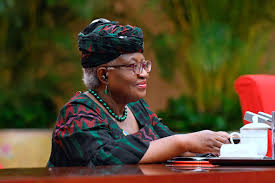-
Says Seeking Foreign Aid is a Thing of the Past
- Safiu Kehinde
Sequel to the shutdown of the United States Agency for International Development (USAID), the Director- General of the World Trade Organization’s (WTO), Ngozi Okonjo-Iweala, has charged African leaders begin local sourcing for funds.
The WTO boss called for a change of mindset as she noted that foreign aid has become a thing of the past.
Okonjo-Iweala gave the charge while addressing journalists at the headquarters of the African Union in Addis Ababa, Ethiopia,on Sunday.
The former Nigerian Minister of Finance said Africa needs to focus on attracting investment and mobilizing our own domestic resources.
“One of the key things that is emanating is a recognition of the present very difficult geopolitical context we are in. And of course, as the head of the WTO, I am right in the middle of it. But one thing is very clear.
“Africa, really, we really need to change our mindset. Access to aid, I think we can begin to think of it as a thing of the past.
“We really have to focus on two things: attracting investment and mobilizing our own domestic resources.
“And I think that is a theme that is running through almost all the meetings here at the AU.
“I think African leaders are recognizing that this is a challenge. But we can also see it as an opportunity.
“And again, I’m glad to say that it’s emerging that look, this could be looked at as an opportunity.
“This morning, we had a session with the Multilateral Development Bank Association of Africa itself, along with President Mahama.
“One of the things we talked about is how do we better mobilize our own resources on the continent to invest in ourselves.
“I pointed out that we have about $250 billion worth of pension funds resources on the continent, which we need to find a way to tap.” she said.
Aside the pension fund, the WTO boss stressed that there are other institutions that Africa can capitalized on and properly channel its resources for development instead waiting to be helped.
She noted that Africa has over 84 national development banks and other financial institutions that can be utilized.
“First, the pension funds need to look at their regulations to see how they change it so that they can invest more on the continent rather than investing more outside. And pension funds from South Africa is the biggest, but you have South Africa, Nigeria, Kenya, Morocco, Botswana, Namibia, and many other countries.
“When you start totalling the resources, it’s huge, hugely significant. 250 billion is the estimate that I have. We have these multilateral development banks like the African Finance Corporation. Afrexim Bank is chairing the Association of African Multilateral Institutions.
“We need to capitalize on them better. Instead of looking outside to see what we can get, we have our own institutions. The shareholders are the African governments. Capitalize them properly so that their balance sheet can expand.
“They have a combined balance sheet now of about 70 billion. But if you look at the $70 billion, but if you look at the needs we have for infrastructure alone, up to more than 200 billion a year, you can see that we need to expand these organisations’ balance sheets.
“We have more than 84 national development banks and financial institutions, quite apart from the multilateral.
“How do we mobilize them and capitalize them better so they can help us finance? In Nigeria, during the time I was finance minister, we raised a diaspora bond of $300 million that was quite successful.
“That’s another type of instrument you can tap, tapping resources of our people outside, not just inside the continent. So there are so many creative and innovative ways we can raise resources.
“I want to end by one thing. Another theme going here at the meeting is the realization that we have to better add value and monetize our mineral resources on the continent.” Okonjo-Iweala added.


